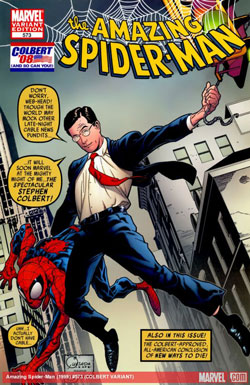When the question of freedom of speech arose worldwide after the Charlie Hedbo incident, the use of satire was scrutinized as well. Does satire still serve the same purpose it has in the past, and what are the limits of using satirical humor and being offensive?
Implied in the US Constitution’s First Amendment are the freedoms to exaggerate, manipulate and to grandstand, which is the definition of satire. Satire is often used to mock political or social figures, movements or organizations through sarcasm, ridicule or irony. It has been used to generate political or social change, and bring awareness to an issue. It most commonly takes the form of mocking politicians.
One of the first political cartoons was created by Benjamin Franklin, a founding father, and was later transformed into the famous colonial battle flag with the legendary saying “Don’t Tread on Me.”
Throughout the years, satire has been a transformative medium, such as through cartoon depictions and television. However, according to Tim Parks of The New York Review, the expansion of technology throughout households and communities worldwide, the mixing of cultures and globalization has made satire more problematic.
Parks continued by questioning, “Now that the whole world is my neighbor, my immediate Internet neighbor, do I make any concessions at all, or do I uphold the ancient tradition of satire at all costs? And again, is a culture that takes mortal offense when an image it holds sacred is mocked a second-rate culture that needs to be dragged kicking and screaming into the twenty-first century, my twenty-first-century that is?”
Dr. Michael Phillips-Anderson, associate professor of communication and instructor of a class on humor, said, “Satire serves an important role as it allows for a critique of power that can be more palatable to the public. When you use humor it might help your audience put down their defenses and listen to a new perspective.”
Adam Gopnik of The New Yorker explained in a Jan. 19 article that Charlie Hebdo made fun of everyone there was to ridicule, and did not single anyone out.
“The magazine was offensive to Jews, offensive to Muslims, offensive to Catholics, offensive to feminists, offensive to the right and to the left, while being aligned with it — offensive to everybody, equally. The right to mock and to blaspheme and to make religions and politicians … all look ridiculous was what the magazine held dear, and it is what its cartoonists were killed for — and we diminish their sacrifice if we give their actions shelter in another kind of piety or make them seem too noble, when what they pursued was the joy of ignobility.”
Satire has become a huge success and an important part of American culture today. Television shows such as The Daily Show, The Colbert Report, South Park and “Weekend Update” on Saturday Night Live have been watched for years by the American public and from time to time, are able to cause either a great impact or a lot of controversy.
Dr. Gregory Bordelon, lecturer of political science, explained the freedom of using satire in America. “Satire, the Court has said many times over (interestingly enough, in a case in 1994 involving rap artists 2 Live Crew making a parody of Roy Orbison’s “Pretty Woman”), can be considered a valued form of political expression, and the government’s hands are tied in trying to suppress it. Could they? Sure, but only for the most compelling reasons and in a fashion that is narrowly tailored.”
Jon Stewart from The Daily Show and Stephen Colbert from The Colbert Report have been mixing politics and humor over the past decade and have had a major impact on younger generations. In 2010, the Pew Research Center for the People and the Press released its survey on news consumption, revealing that, “In terms of age, The Colbert Report (80 percent), The Daily Show (74 percent) and The New York Times (67 percent) have the biggest percentage of viewers and readers in the coveted 18-49-year-old demographic.” The humorbased context has proven to be very effective with the younger demographics, avidly allowing them to stay informed.
Some shows, however, tend to push the envelopes on cultural issues until controversy takes place.
In season ten of South Park, the creators of the show featured a plot in which a network was debating whether or not an animated television series was going to show an animated version of the Prophet Muhammad. One of the characters convinced the network to show the image uncensored, echoing the creators’ thoughts regarding what should or should not be censored. They believed that if they were to “make fun” of any religions, it should be all or none. Comedy Central refused to broadcast the image of the prophet by blocking that segment of the episode. The creators of South Park received various letters of complaint and even death threats.
Others have thought that the use of political satire is “dumbing down the regular politics” and “creating a more cynical public,” as Chuck Todd said in an episode of Meet the Press. Lewis Black, a comedian and a correspondent to The Daily Show said, “We are living on the corner where satire and reality intersect.” The way we have gotten to this place, he believes, is because of the constant appearance of the news in social media and cable. “You watch these people over and over again saying the same thing, the third time you hear it, you’re laughing at them.”
Laura Krafft, a staff writer for The Colbert Report, explained that the reason why political satire has become so popular is because “you feel like you trust a comedian more than you would trust maybe somebody who’s a member of the media who’s been fed information for different reasons from different political groups.”
Taylor Buttaro, a sophomore majoring in biology, explained why she enjoys satirical comedy. “Because of [shows that involve satirical comedy], I do find myself more interested in politics. The way they present what is going on is more relatable than non-satirical news stations. When I watch them I feel like I’m being talked down to.”
“For this generation we enjoy the humor because it intrigues us so that we want to be more educated about current events. In this day in age, we have a need to have all the information at once, and if it takes too long to get it, we stop caring. The humorous and satirical shows are shorter and present the information in a way that keeps you interested the whole time,” said Buttaro.
In contrast to the recent attacks on Charlie Hebdo, Phillips-Anderson said, “They had every right to publish what they did, but that doesn’t mean it was effective satire. There is no way to say that the attack could or should have been avoided by Charlie Hebdo. Other people chose to use violence as a means of persuasion. You cannot make an equivalency between violence and satire, but it would be naïve to argue that satire, like any discourse, is an instrument of power and can have real effects in the world.”
IMAGE TAKEN from marvel.com




